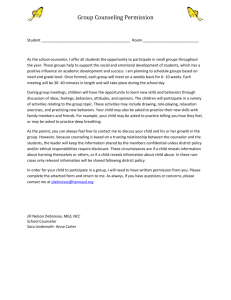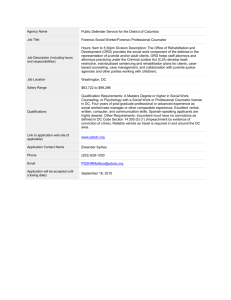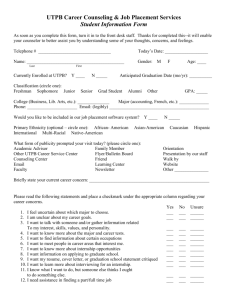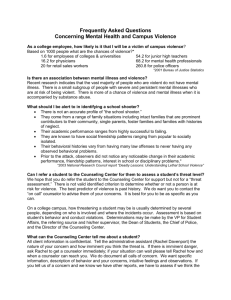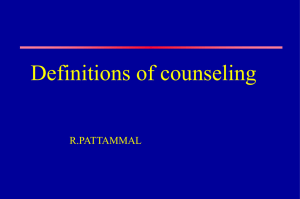Ethical Dilemma--#3--To warn or not to warn - CPR
advertisement
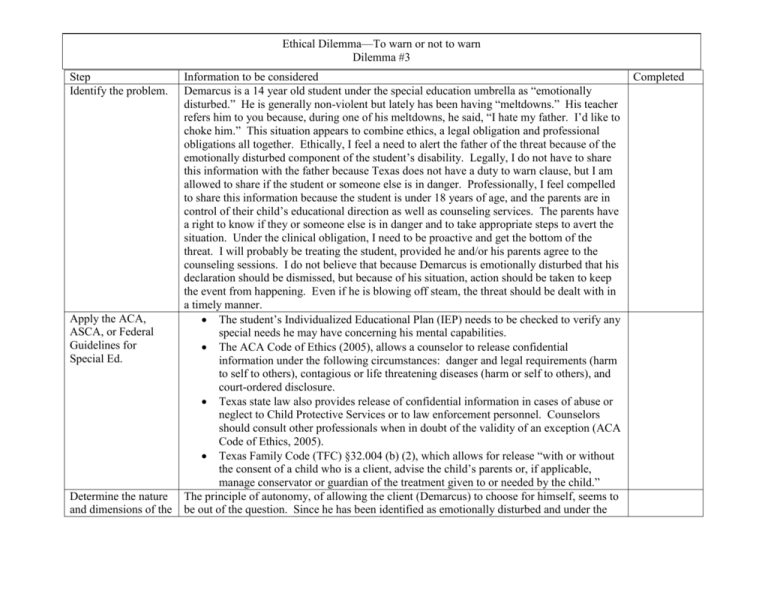
Ethical Dilemma—To warn or not to warn Dilemma #3 Step Identify the problem. Apply the ACA, ASCA, or Federal Guidelines for Special Ed. Determine the nature and dimensions of the Information to be considered Demarcus is a 14 year old student under the special education umbrella as “emotionally disturbed.” He is generally non-violent but lately has been having “meltdowns.” His teacher refers him to you because, during one of his meltdowns, he said, “I hate my father. I’d like to choke him.” This situation appears to combine ethics, a legal obligation and professional obligations all together. Ethically, I feel a need to alert the father of the threat because of the emotionally disturbed component of the student’s disability. Legally, I do not have to share this information with the father because Texas does not have a duty to warn clause, but I am allowed to share if the student or someone else is in danger. Professionally, I feel compelled to share this information because the student is under 18 years of age, and the parents are in control of their child’s educational direction as well as counseling services. The parents have a right to know if they or someone else is in danger and to take appropriate steps to avert the situation. Under the clinical obligation, I need to be proactive and get the bottom of the threat. I will probably be treating the student, provided he and/or his parents agree to the counseling sessions. I do not believe that because Demarcus is emotionally disturbed that his declaration should be dismissed, but because of his situation, action should be taken to keep the event from happening. Even if he is blowing off steam, the threat should be dealt with in a timely manner. The student’s Individualized Educational Plan (IEP) needs to be checked to verify any special needs he may have concerning his mental capabilities. The ACA Code of Ethics (2005), allows a counselor to release confidential information under the following circumstances: danger and legal requirements (harm to self to others), contagious or life threatening diseases (harm or self to others), and court-ordered disclosure. Texas state law also provides release of confidential information in cases of abuse or neglect to Child Protective Services or to law enforcement personnel. Counselors should consult other professionals when in doubt of the validity of an exception (ACA Code of Ethics, 2005). Texas Family Code (TFC) §32.004 (b) (2), which allows for release “with or without the consent of a child who is a client, advise the child’s parents or, if applicable, manage conservator or guardian of the treatment given to or needed by the child.” The principle of autonomy, of allowing the client (Demarcus) to choose for himself, seems to be out of the question. Since he has been identified as emotionally disturbed and under the Completed problem. age of 18, I believe his parents should be given the opportunity to decide if they want him to receive counseling services or not. He too should be included in the conversation, but ultimately, his parents should make the final decision. The concept of non-maleficence is perhaps the main concern in this situation. Demarcus had indicated that he would like to choke his father and would be causing harm to others. Protecting the object of Demarcus’s frustration (his father) has to be taken into consideration. As a counselor, I need to work with Demarcus to help him understand that harming oneself or others is not a healthy way to handle any situation. The principle of beneficence requires the counselor to work toward the welfare of the client, Demarcus, and at the same time prevent harm to oneself or others. I would need to help Demarcus develop coping skills on a level that he can understand. Since the concept of justice does not require a counselor to treat everyone the same, I will have some leeway in the approaches I use to help Demarcus confront his anger issues. I believe that his emotional disturbed “label” allows me to treat him differently than someone else who does not carry that label. I believe his individual situation requires me as the counselor to approach his treatment with an understanding that I may need to seek outside help in his treatment. Demarcus should expect me to keep his confidences or fidelity, just as I would with any other client. The duty to disclose confidential information is given by the Texas Family Code (TFC) §32.004 (b) (2), which allows for release “with or without the consent of a child who is a client, advise the child’s parents or, if applicable, manage conservator or guardian of the treatment given to or needed by the child.” The ACA Code of Ethics (2005), allows a counselor to release confidential information under the following circumstances: danger and legal requirements (harm to self to others), contagious or life threatening diseases (harm or self to others), and court-ordered disclosure. Generate a potential course of action. As the counselor, I feel I must counsel Demarcus and work on his anger issues. I will work closely with Demarcus and his parents to help defuse the situation. I would confer with the teacher who notified me of the threat to see if she has noticed any change in his behavior since the incident was reported. If I am unable to make adjustments in his coping skills, I will need to seek help from an outside source. I would, of course, discuss the matter with Demarcus and his parents. I do not believe his threats should be dismissed as a child blowing off steam or not take the threat seriously. Given his emotionally disturbed impairment, I think the threat carries more weight. If he has trouble with reality, he may be confused with right and wrong. He needs to be shown coping mechanisms on his level to handle difficult situations. I visited with Mrs. Sabrina Murphy, a special education teacher, about this situation. She advised me that since Demarcus is emotionally disturbed, he should have a Behavioral Intervention Plan (BIP) on file, and I should become familiar with it before acting. She also informed me that more needs to be known about the student’s background, for instance: Socioeconomic situation-homeless, free or reduced lunch, etc. Family situation-parents married, divorced, deceased, living with grandparent, etc. How the student arrives at school-walks, parents bring him, bus Other siblings-living at home, with someone else, or only child Cultural background Mrs. Murphy also indicated that I should consider individual, group, and family counseling in order to better serve the needs of the student. Consider the potential It is hard to determine what should be done without knowing all the information about consequences of all Demarcus’s emotional condition. If I do not involve his parents in the counseling sessions or options and determine make the aware of the situation, then things could become progressively worse. By making a course of action. his parents aware, they are free to determine what course of action they wish to pursue. His parents may be more aware of what caused the outburst and are better equipped to handle the situation. They may not know how to help their son and be appreciative of the help that I could offer. I would consider individual counseling with Demarcus, group counseling with other students, and family counseling to help alleviate the tension within the home. As with most dilemmas, doing nothing as in this case is not an option. I would continue to confer with the teacher who first brought the problem to me to verify if there is any change in Demarcus’s behavior. Evaluate the selected As I evaluate my course of action, which is to counsel Demarcus and involve his parents course of action. about the situation, I have no problem doing the same thing if the occasion were to rise again. Given the same information on a different case, I would take the same measures: counsel the student and make the parents aware of the situation. I do not believe I would have a problem with my actions plastered all over the newspaper. My actions could prevent someone from being harmed, and if the danger is not really present, it would allow the parents to choose their own course of action or non-action. Given the same situation, I would have no problem advising a colleague to do the same. I would feel less guilty if this were all a mistake than I would if Demarcus acted on his threat toward his dad. I believe the law would be more forgiving if I divuldged confidential information and a situation was averted, than if I ignored the threat and harm was done. Implement the Course Begin counseling Demarcus and keep his parents abreast of the progress or lack thereof. I of Action. would follow up with the teacher who referred Demarcus to me in the first place to verify if progress is showing up in the classroom. References American Counseling Association. (2005). Code of ethics and standards of practice. Retrieved from http://www.counseling org/ Herbert, J. D. (2002). The duty to warn: a reconsideration and critique. Journal of American Academy Psychiatry Law, 30(3), 417-424. Retrieved from http:www.jaapl.org/cgi/reprint/30/03/417/pdf McCaslin, D. L. (2009, March 10). [Web log message]. Retrieved from http:dlmccaslin.wordpress.com/2009/03/10/the-tarasoff-case/ Texas Constitution and Statutes, Texas Education Agency. (n.d.). Texas education code. Retrieved from http://www.statutes.legis.state.tx.us/Index.aspx U. S. Department of Education, Family Policy Compliance Office. (Nod). Family educational rights and privacy act (20 U.S.C. 1234g; 34 CFR Part 99). Washington, DC: Government Printing Office. Retrieved from http://www2.ed.gov/print/policy/gen/guid/fpco/ferpa/index.html



